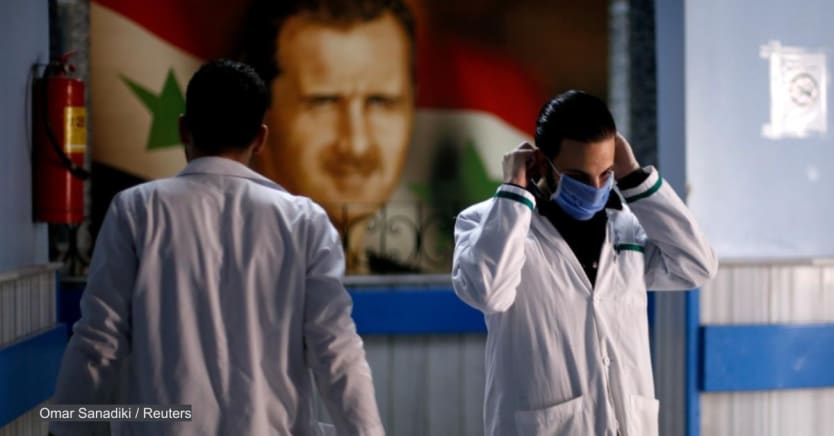
A decade ago, peaceful demonstrations rippled across Syria, but instead of being met with much-needed reforms, they were met with bullets, arrests, torture, and eventually, airstrikes against civilians and chemical weapons attacks. The result is the catastrophic destruction of much of Syria. But it’s not over — not for Syrians nor for the rest of us.
The total number of dead is unknown, and the number of refugees is an estimate. But both continue to grow every day. As physicians and public health advocates, we know that the devastation is deep and wide. We have seen it, supported the affected communities, and studied the impacts.
Even in the early years of the conflict, health care workers were, as they often are, highly exposed. By the nature of their work, they bore witness to the violent crackdown and cared for wounded and sick people.
It was not long until fulfilling their duty to care for everyone led to accusations they were supporting the revolution. Within that first year, doctors, nurses, and others were part of the thousands of Syrians arrested, detained, tortured, and killed. Soon thereafter, clinics and hospitals were shut down, attacked, or bombed.
One of us, Dr. Naser Almhawish, survived bombings in Syria before being displaced.
At first, intelligence officers in the hospital and the operating theater threatened us with execution if we did not prioritize their comrades. Then it was ISIS demanding we work under their authority and their rules.
And then bombings, from all sides. They were striking hospitals and doing it with precision. It was hard enough to work long hours for continuous days, managing all this trauma with minimal supplies. But doing all that with no security was an impossible situation.
Another one of us, Dr. Ahmad Tarakji, has rebuilt hospitals, only to see them bombed again. The targeted hospitals were civilian facilities, civilian neighborhoods, and not anywhere near the conflict’s frontline. Before the Russians, barrel bombs, costing a few hundred dollars, were dropped in civilian neighborhoods and hospitals by the Syrian air force.
In this sense, accountability could also mean documenting and acknowledging what the Syrian people have experienced and bearing witness to the violence with support for research for future generations to understand.
—The pattern of attacking hospitals forced some communities to refuse rebuilding any hospital in their village or town. In other settings, hospitals were built in caves or moved underground. The rate of targeting hospitals doubled since Russia became directly involved in the war in 2016, and it reached its peak in late 2016. Continuing on this path of impunity will reshape future wars and even peacetime behavior, to the detriment of all.
International humanitarian diplomacy in Syria can be summarized as half-hearted, ineffective, and not nearly enough — we have done almost nothing to support the victims, mitigate the harm, or hold criminals accountable. The U.S. has done little beyond occasional air raids and press releases. In our battle against ISIS, we too have contributed to the attacks on civilians. European countries fare just a hair better.
When violence against healthcare continues without attention or accountability, it leads to worsening security and worsening health globally. Last month, researchers reported on over 400 attacks against health care workers related to the COVID-19 pandemic globally.
These were not by armed groups or in a conflict setting — they were by frustrated family members or neighbors fearing contagion. The uptick in violence suggests that attacks against health workers are becoming normalized — not just for Syria, but for all of us.
This comes just as COVID-19 has shown the world the importance and essential role of health care providers. While no one is holding their breath for Presidents Bashar Assad or Vladimir Putin’s prosecutions, real, meaningful accountability does not require it. It requires a visible commitment to the future — both for the Syrian people and for the protection of health care workers globally.
So, we need to seek accountability for everyone’s good. Traditional accountability, resulting in war criminals’ prosecutions, is still far off for Syria but needs political and diplomatic pressure.
But accountability is not only about legal processes. We propose a broader but more meaningful and forward-looking view of accountability. While arresting and prosecuting war criminals undoubtedly has benefits for the world at large in the long term, there are many other ways to restore dignity and rights to those still impacted by the conflict.
In this sense, accountability could also mean documenting and acknowledging what the Syrian people have experienced and bearing witness to the violence with support for research for future generations to understand. It can also mean support for reconstruction. With additional funding, we can rebuild destroyed hospitals, finance medical education, and support stronger public health and vaccination programs.
Repealing overly strict anti-terrorism laws can also improve the flow of humanitarian aid. And resettling some of the millions of people living in refugee camps could support another generation of young Syrians.
While no one is holding their breath for Assad or Putin’s prosecutions, real, meaningful accountability does not require it. It requires a visible commitment to the future — both for the Syrian people and for the protection of health care workers globally.
A decade of catastrophe and impunity is enough. The pandemic rages on in Syria, and a deepening economic crisis puts communities at risk of famine and, worse, devastation. We have the moral imperative, the public health necessity, and the fresh political opportunity to advocate for strengthening support for the Syrian people while ensuring healthcare workers’ security across the globe.




